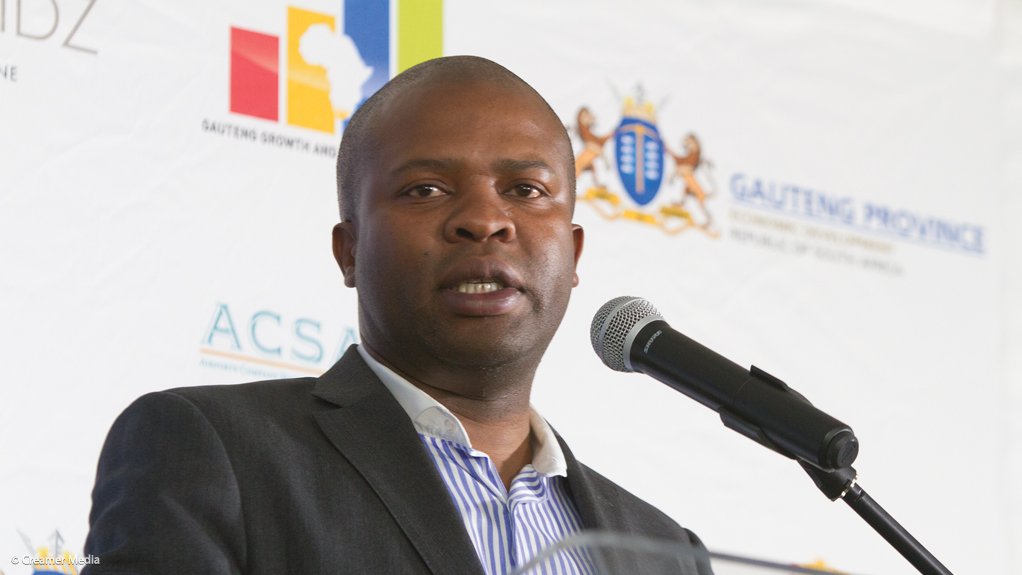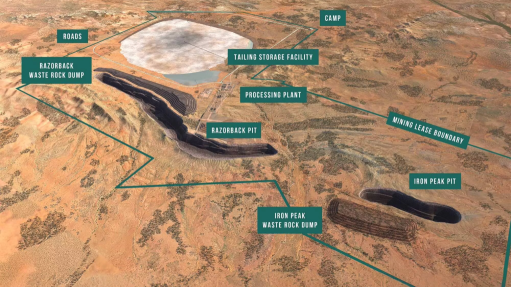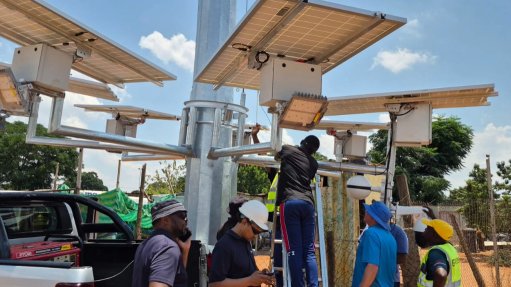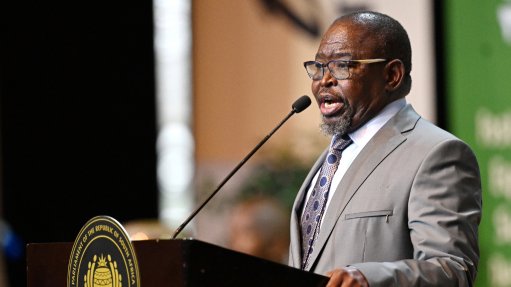E-tolls debt bites into Gauteng’s finances


Gauteng Finance and Economic Development MEC Lebogang Maile
Photo by Creamer Media
Hard choices are having to be made to enable the Gauteng provincial government (GPG) to meet its e-toll debt obligations.
In 2022, the GPG accepted its 30% debt contribution to settle South African National Roads Agency Limited’s debt and interest obligations for the scrapped Gauteng Freeway Improvement Project (GFIP) tolling initiative. National government covered the 70% balance. By April 2024, the gantries were switched off.
On September 30, the GPG paid R3.8-billion to the National Treasury – the first of five equal instalments of its agreed R12.9-billion (excluding interest and maintenance) contribution to historical e-toll debt – with subsequent payments to be made every June until the debt is paid.
“The total debt of R20.1-billion, inclusive of interest, is a substantial bite into our already stretched and limited resources. To meet our obligations to repay this debt, we have had to make very difficult decisions and reorientate our budget priorities, which will have an impact on the fiscus,” Gauteng Finance and Economic Development MEC Lebogang Maile said on Tuesday.
Presenting Gauteng’s 2024 Medium-Term Budget Policy Statement and the adjustment budget to the Gauteng Provincial Legislature, he explained that the debt obligation necessitated the implementation of a host of reforms and measures to maintain a healthy financial environment that will be both sustainable and manageable in the long term.
“As the GPG, we have a full appreciation of the implications that repaying the e-toll debt will have on our financial position. This will be particularly pronounced in the 2025 Medium-Term Expenditure Framework (MTEF), given developments in the Provincial Equitable Share (PES) formula.”
The PES formula is recalibrated each year, using data from Statistics South Africa and other administrative sources such as the national departments of Health and Basic Education, which ensures equitable resource allocation.
Owing to a decline in Gauteng’s share of the national population, the province faces further budgetary reductions, and key components such as education, health and poverty alleviation, which collectively account for 91% of the PES formula, will be affected, creating additional financial pressure.
“This impact will be minimised as far as possible so as to ensure that basic services continue to be provided to the residents of Gauteng,” he continued, assuring that despite the difficult position that the repayment of this debt had put the province in, it was not all “doom and gloom”.
“The resolution of the GFIP has unlocked an R85-billion pipeline for the non-toll network over the next three years. That the province will have to pay a substantial amount over the next five years towards the cost of the GFIP I road network is short-term pain that should not cause despondency over the future financial trajectory of the province.”
Meanwhile, Maile pointed out that infrastructure maintenance and development remains a key priority for the GPG, with a total budget of R37.2-billion, over the MTEF, allocated for the infrastructure programme.
“Recognising the need to plan for the future of the growing population and needs, R22-billion of this amount is availed for the maintenance and rehabilitation of existing infrastructure and providing new infrastructure assets in response to the increasing demand for services,” he commented.
With substantial pressures on the fiscus, the province will continue to introduce reforms and innovative delivery options, along with the reprioritisation of budgets, identification of efficiency gains and making trade-offs, to fund government priorities and increase the funding envelope for infrastructure projects.
“The worsening state of public finances may hinder the government's ability to initiate other planned capital expenditure projects. This, in turn, may also affect municipal infrastructure grants as the fiscal resources continue to decline and with it infrastructure investment that is crucial for economic growth,” Maile says.
Provincial departments and entities must explore alternative sources of funding to supplement the existing constrained revenue streams.
Partnerships with the private sector, donors, and developmental finance institutions are among the possible alternative funding sources.
ADJUSTMENT BUDGET
Meanwhile, presenting the adjustment budget, Maile outlined that a total of R1.2-billion was rolled over to the 2024/25 financial year from the 2023/24 financial year, comprising R920.9-million in conditional grants and R282.5-million in PES funds.
These funds are for defraying prior-year expenditure by various departments relating to goods and services and commitments in payments for capital assets.
In the 2024/25 financial year, the budget will be adjusted upwards by an amount of R2.1-billion.
An amount of R135-million is allocated to the Office of the Premier, of which R73.9-million is for outstanding Life Esidimeni claims, R57.4-million for the Commission of Inquiry into the Usindiso Building fire, and R4.2-million for South African Police Service security to the commission of inquiry, while the Gauteng Provincial Legislature is allocated R53.7-million.
The GPG also allocated additional funds to prevent the cutting of jobs in education, health or any of the sectors that have been impacted by the budget cuts and debt prioritisation.
To partially offset pressures in compensation of employees, additional allocations have been made: R600-million for the Department of Health; R300-million for the Department of Education; R70-million for the Department of Social Development; R59-million for the Department of Environment; and R42.2-million for the Department of Infrastructure Development (DID).
“As part of supporting the most vulnerable members of society, an additional amount of R221.8-million is allocated to reinstate the budget allocated to qualifying nonprofit institutions back to the 2023/24 baseline of R2.1-billion and an additional amount of R109-million is allocated to the Department of Human Settlements to fund interim sanitation.”
The Department of Roads and Transport is allocated R260-million, of which R250-million is to cover the shortfall in the Gautrain Patronage Guarantee, a contractual commitment, and the balance of R10-million towards goods and services.
For the Department of Community Safety, R68.5-million is reallocated, comprising interdepartmental receivable balances, which are funds spent on behalf of other organs of State.
An amount of R8.3-million is allocated for the establishment of the Department of Environment, of which R2.4-million and R5.8-million is for the establishment of the Office of the Head of Department and Office of the MEC, respectively.
Additionally, an amount of R128-million is allocated to DID for office accommodation.
“We will also allocate an amount of R150-million to the Department of e-Government towards the replacement of obsolete equipment for the Gauteng Provincial Network,” Maile concluded.
Article Enquiry
Email Article
Save Article
Feedback
To advertise email advertising@creamermedia.co.za or click here
Press Office
Announcements
What's On
Subscribe to improve your user experience...
Option 1 (equivalent of R125 a month):
Receive a weekly copy of Creamer Media's Engineering News & Mining Weekly magazine
(print copy for those in South Africa and e-magazine for those outside of South Africa)
Receive daily email newsletters
Access to full search results
Access archive of magazine back copies
Access to Projects in Progress
Access to ONE Research Report of your choice in PDF format
Option 2 (equivalent of R375 a month):
All benefits from Option 1
PLUS
Access to Creamer Media's Research Channel Africa for ALL Research Reports, in PDF format, on various industrial and mining sectors
including Electricity; Water; Energy Transition; Hydrogen; Roads, Rail and Ports; Coal; Gold; Platinum; Battery Metals; etc.
Already a subscriber?
Forgotten your password?
Receive weekly copy of Creamer Media's Engineering News & Mining Weekly magazine (print copy for those in South Africa and e-magazine for those outside of South Africa)
➕
Recieve daily email newsletters
➕
Access to full search results
➕
Access archive of magazine back copies
➕
Access to Projects in Progress
➕
Access to ONE Research Report of your choice in PDF format
RESEARCH CHANNEL AFRICA
R4500 (equivalent of R375 a month)
SUBSCRIBEAll benefits from Option 1
➕
Access to Creamer Media's Research Channel Africa for ALL Research Reports on various industrial and mining sectors, in PDF format, including on:
Electricity
➕
Water
➕
Energy Transition
➕
Hydrogen
➕
Roads, Rail and Ports
➕
Coal
➕
Gold
➕
Platinum
➕
Battery Metals
➕
etc.
Receive all benefits from Option 1 or Option 2 delivered to numerous people at your company
➕
Multiple User names and Passwords for simultaneous log-ins
➕
Intranet integration access to all in your organisation


















